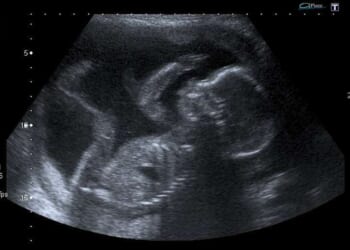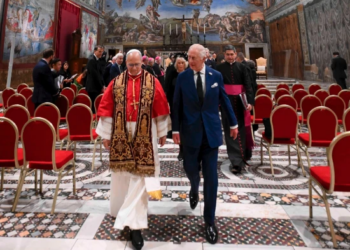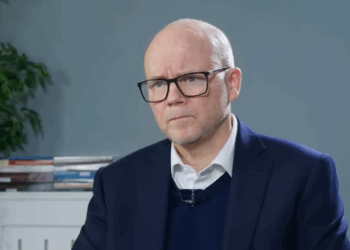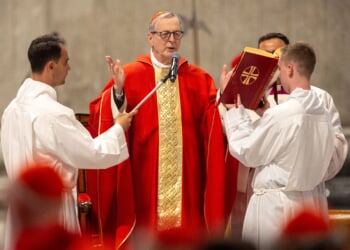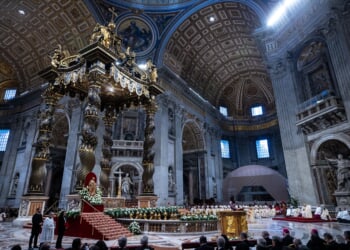International Interfaith Conference “United in Liberty: The Rise of Spiritual Diplomats”
On October 28, 2025, the Cannon Caucus Room inside the U.S. Capitol Complex, Washington D.C. will host a gathering unlike any other on the global diplomatic calendar. Religious leaders, policymakers, legal scholars, and civil society representatives from across the world will convene for the International Interfaith Conference United in Liberty: The Rise of Spiritual Diplomats, held on the ALLATRA Platform.
More than a conventional meeting of faith leaders, this inaugural event marks the launch of the Universal Grain Conference Series, a project focused on civic diplomacy and led by the volunteers of ALLATRA International Public Movement, built on research and dialogue spanning more than 180 countries. Its purpose is clear and inspiring: to affirm humanity’s shared values, to model unity in the face of challenges, and to defend religious liberty at a time when freedom of belief is under pressure in many corners of the world.
At the center of this effort stands Pastor Mark Burns, Spiritual Diplomat, Spiritual Advisor to President Donald Trump, labeled by TIME Magazine as Trump’s Top Pastor and named one of the 16 people to shape the 2016 presidential election by Yahoo News. Pastor Burns is a guiding figure and one of the most visible voices for religious freedom on the global stage. Recognized as both a pastor and, as Spiritual Diplomat, Burns brings with him years of experience engaging with world leaders, faith communities, and grassroots movements.
The Emergence of Spiritual Diplomats
The theme of “Spiritual Diplomacy” is not merely symbolic. Pastor Burns defines the Spiritual Diplomat as a faith leader who steps into spaces where traditional diplomacy falters. Unlike politicians or state envoys, Spiritual Diplomats are not bound by party lines or governmental portfolios. They carry neither weapons nor policy briefs, but instead approach leaders and communities with what Burns calls “the heart of God.”
This model traces its inspiration to the late Reverend Billy Graham, who preached to millions but also advised presidents and prime ministers in private. Burns sees himself and other faith leaders across traditions, imams, rabbis, priests, and pastors, as continuing that legacy. They operate in refugee camps, legislative offices, and regions torn by conflict, speaking truth where it is unwelcome and advocating peace where politics has failed.
“Faith leaders must go where politics cannot,” Burns has said, underscoring that “We carry no weapons, only wisdom. This is not about politics, but about people, peace, and the future we share.”
A Program Designed for Global Impact
The one-day conference will feature two high-level panels. The first will focus on the universal values and responsibilities of religious leaders, exploring how compassion, justice, and human dignity can be strengthened across traditions. The second will address the protection of religious freedom, analyzing case studies and legal frameworks while sharing advocacy strategies.
Beyond the panels, the gathering is intended as a working dialogue. Participants will examine practical approaches to some of the world’s most urgent questions: How can faith communities collaborate across divides? How can religious leaders maintain moral authority in polarized societies? And how can freedom of worship be preserved amid rising authoritarianism, cultural clashes, and ongoing conflicts?
The discussions are not meant to remain confined within the walls of the Capitol. Organizers plan to release official video of the conference in at least ten languages, extending the reach of the event to audiences worldwide.
Building on the Universal Grain Project by ALLATRA
The conference also marks the next step in the Universal Grain Project, a research and dialogue initiative of the ALLATRA International Public Movement. Since 2017, this volunteer-led project has sought to uncover the shared aspirations and values that unite people across diverse backgrounds. Through surveys, interviews, conferences, and documentaries, it has engaged voices from more than 180 countries.
The project’s findings emphasize that, despite cultural and religious differences, humanity shares a common foundation: the desire for dignity, peace, freedom, and security. In this sense, the Universal Grain provides a research-based underpinning to the principles of Spiritual Diplomacy.
The ALLATRA International Public Movement itself is an independent, volunteer-driven alliance recognized for its large-scale research in geodynamics, environmental challenges, and human rights. With participants in more than 180 countries, ALLATRA has advanced interdisciplinary cooperation among scientists, faith leaders, and civil society to address global risks and strengthen fundamental freedoms. Its commitment has been acknowledged at the highest levels of faith leadership, Pope Francis granted the movement an Apostolic Blessing in 2024, followed in 2025 by Pope Leo XIV, who extended his blessing to ALLATRA’s president and its global volunteer community.
Pastor Burns: An Example of Spiritual Diplomat
Pastor Burns’ role in convening this event reflects his own journey as a global advocate. He is known across the globe as a Spiritual Advisor to President Donald Trump. Based in South Carolina, he is the founder of Harvest Praise & Worship Center and co-founder of The NOW Television Network, which broadcasts Christian programming across the United States, Africa, and Europe. His media platform extends his voice to millions, while his personal diplomacy has taken him into the offices of presidents and the halls of the United Nations.
Over the past decade, Burns has met with world leaders including President Donald J. Trump, President Félix Tshisekedi of the Democratic Republic of Congo, President Volodymyr Zelenskyy of Ukraine, and Prime Minister Russell Dlamini of Eswatini. He has also engaged with figures from India, South Korea, and across Africa and Europe, demonstrating his commitment to interfaith dialogue and human rights.
Major media outlets, from CNN to the BBC, have described him as one of the most prominent faith leaders at the intersection of religion and politics. Time magazine once called him “Donald Trump’s Top Pastor,” while Yahoo! News listed him among the “16 People Who Shaped the 2016 Presidential Election.” Yet Burns resists being defined in political terms, insisting that his work is not partisan but pastoral, not about policies but about peace.
A Timely Dialogue
The timing of the conference is significant. Around the world, societies face rising polarization, armed conflicts, and attacks on religious minorities. At the same time, global governance structures are under strain, and traditional diplomatic channels often struggle to resolve deeply rooted conflicts.
Against this backdrop, the idea of Spiritual Diplomacy seeks to fill a gap. By emphasizing conscience over politics, shared humanity over division, and reconciliation over confrontation, faith leaders can play a critical role in reshaping international dialogue.
For diplomats and policymakers attending the event, the message is clear: religious voices cannot be sidelined in discussions about peace, human rights, and security. For faith leaders, the conference represents both a call to action and a reminder of their enduring moral responsibility.
Pastor Burns, reflecting on the vision, put it simply: “This is not about conquest. This is about calling. Let us work together. Let us speak together. Let us lead together.”
If those words resonate beyond the walls of the U.S. Capitol and into the chambers of governments and communities worldwide, the October 28 conference may well mark a turning point in how faith and diplomacy intersect in the 21st century.
For more information and registration, visit the official website: https://interfaithconf.org/
Members of the editorial and news staff of the Daily Caller were not involved in the creation of this content.

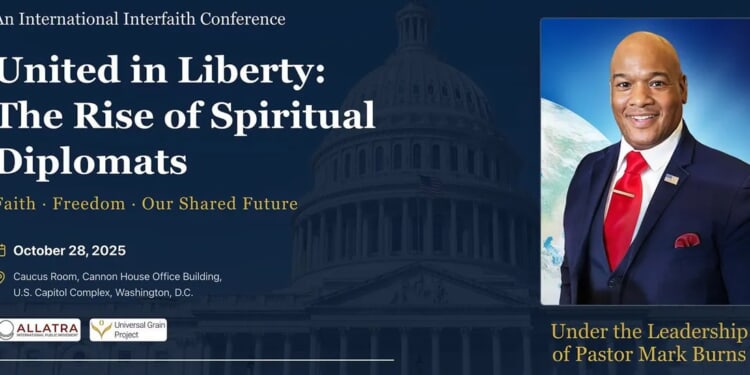







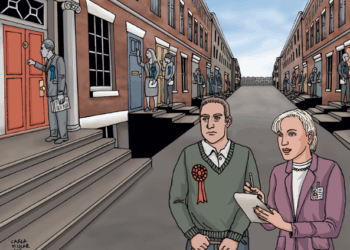
![Donald Trump Slams Chicago Leaders After Train Attack Leaves Woman Critically Burned [WATCH]](https://www.right2024.com/wp-content/uploads/2025/11/Trump-Torches-Powell-at-Investment-Forum-Presses-Scott-Bessent-to-350x250.jpg)

